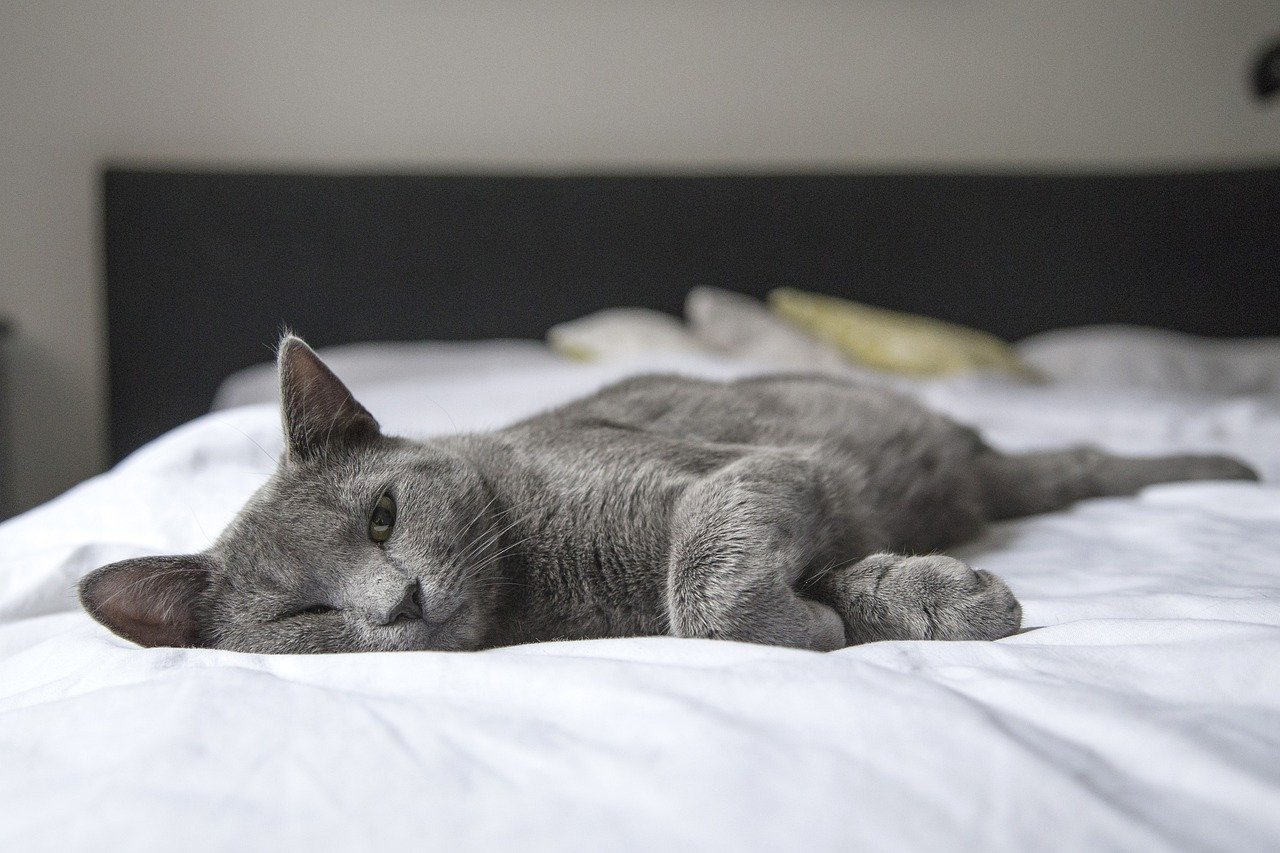As a cat owner, few things are as frustrating as discovering that your feline friend has peed on your bed. Cats are generally clean animals who use their litter boxes faithfully, so when they start peeing on your bed, it’s a clear signal that something is wrong. Understanding why your cat engages in this behavior is crucial for resolving the issue and maintaining a harmonious home. This article will delve into the reasons behind this perplexing behavior and offer practical solutions to address it.
The Basics of Cat Urination Behavior
Before exploring specific reasons for inappropriate urination, it’s essential to understand that cats’ urination habits are deeply tied to their physical and emotional well-being. Cats urinate to mark their territory, communicate with other cats, and eliminate waste. When a cat starts peeing outside the litter box, it can indicate a range of issues from medical problems to environmental stressors.
Medical Reasons for Inappropriate Urination
The first step in addressing your cat’s inappropriate urination is to rule out any medical issues. Several health problems can cause a cat to avoid the litter box.
1. Urinary Tract Infections (UTIs)
UTIs are a common cause of inappropriate urination. Symptoms include frequent urination, straining to urinate, and urinating in unusual places. A UTI can cause discomfort, making your cat associate the litter box with pain, leading them to avoid it.
2. Bladder Stones or Crystals
Bladder stones or urinary crystals can cause severe pain and difficulty urinating. This condition often requires veterinary intervention, including a change in diet or surgery.
3. Kidney Disease
Kidney disease is common in older cats and can cause increased thirst and urination. Cats with kidney disease may not make it to the litter box in time or may avoid it due to the discomfort associated with urinating.
4. Diabetes
Diabetes increases a cat’s thirst and urination frequency. Cats with diabetes may have accidents outside the litter box due to the increased volume of urine.
Behavioral Reasons for Inappropriate Urination
If your cat is healthy but still peeing on your bed, behavioral issues may be at play. Understanding these behaviors can help you address the root cause.
1. Stress and Anxiety
Cats are sensitive creatures and can become stressed or anxious due to various factors, including changes in their environment, the addition of new pets, or changes in their routine. Stress can manifest as inappropriate urination.
- Changes in Routine: Cats thrive on routine. Changes such as a new work schedule, a move, or even changes in the type of food can cause stress.
- New Pets or People: Introducing new pets or people into the household can make your cat feel threatened, leading to territorial marking behaviors.
2. Territorial Marking
Cats mark their territory by urinating. This behavior is more common in multi-cat households or if there are outdoor cats in the area. Your cat may feel the need to mark its territory, especially on objects that carry your scent, like your bed.
3. Litter Box Issues
Litter box aversion is a common cause of inappropriate urination. Cats may avoid the litter box for several reasons:
- Dirty Litter Box: Cats are clean animals and prefer a clean litter box. If the box is dirty, they may look for cleaner places to urinate.
- Uncomfortable Litter: Some cats are sensitive to the type of litter used. If the litter is uncomfortable, they may avoid the box.
- Inconvenient Location: The location of the litter box matters. It should be in a quiet, accessible place away from noisy appliances or high-traffic areas.
- Litter Box Size and Type: Ensure the litter box is the right size for your cat. Some cats prefer covered boxes, while others prefer open ones.
Why Did My Cat Pee on My Bed?
Understanding the specific triggers that led to your cat peeing on your bed can help you address the problem more effectively.
1. Scent Association
Your bed carries your scent, which can be comforting for your cat. If they are stressed or anxious, they may urinate on your bed as a way of mingling their scent with yours, seeking comfort and security.
2. Seeking Attention
Sometimes, cats pee on beds to get your attention. If they feel neglected or stressed by changes in the household, they might resort to this behavior to communicate their distress.
3. Inappropriate Litter Box Conditions
If the litter box is not up to your cat’s standards—whether it’s too dirty, has the wrong type of litter, or is in a bad location—they may choose your bed as a more suitable alternative.
How to Stop Your Cat from Peeing on Your Bed
Addressing this issue involves a combination of medical treatment, behavioral modification, and environmental adjustments. Here are some steps to take:
1. Visit the Vet
If your cat is peeing on your bed, the first step is to visit the vet to rule out any medical conditions. Treating underlying medical issues is crucial for resolving the behavior.
2. Reduce Stress and Anxiety
Reducing your cat’s stress can prevent inappropriate urination. Here are some strategies:
- Create a Safe Space: Provide a quiet, comfortable area where your cat can retreat and feel secure.
- Maintain a Routine: Stick to a consistent feeding and play schedule to provide stability.
- Use Calming Products: Products like Feliway diffusers or calming collars can help reduce stress and anxiety in cats.
- Provide Enrichment: Interactive toys, scratching posts, and climbing structures can keep your cat mentally and physically stimulated, reducing stress.
3. Improve Litter Box Conditions
Ensure your cat’s litter box is clean, comfortable, and conveniently located:
- Keep the Litter Box Clean: Scoop the litter box daily and change the litter regularly.
- Choose the Right Litter: Experiment with different types of litter to find one that your cat prefers.
- Optimize the Location: Place the litter box in a quiet, accessible area away from noisy appliances or high-traffic areas.
- Provide Multiple Litter Boxes: In multi-cat households, provide multiple litter boxes to reduce competition and stress.
4. Use Positive Reinforcement
Positive reinforcement can encourage your cat to use the litter box consistently:
- Reward Good Behavior: When your cat uses the litter box, reward them with treats, praise, or playtime.
- Avoid Punishment: Punishing your cat for inappropriate urination can increase stress and worsen the problem.
5. Clean Up Accidents Thoroughly
Cleaning up accidents thoroughly can prevent your cat from being attracted to the same spot again:
- Use Enzymatic Cleaners: Enzymatic cleaners break down the proteins in urine, effectively removing odors that attract cats to urinate in the same spot.
- Avoid Ammonia-Based Cleaners: Ammonia smells similar to urine and can attract your cat to the area.
6. Block Access to the Bed
While you’re addressing the underlying issues, it can be helpful to block your cat’s access to your bed temporarily:
- Close the Bedroom Door: Keep your bedroom door closed to prevent your cat from accessing the bed.
- Use a Protective Cover: Place a waterproof cover or a pet deterrent mat on your bed to discourage your cat from peeing there.
Preventing Future Incidents
Preventing future incidents requires ongoing attention to your cat’s health, behavior, and environment. Here are some additional tips to help:
1. Regular Vet Check-Ups
Regular vet check-ups can help detect and treat medical issues early, preventing inappropriate urination due to health problems.
2. Monitor Changes in Behavior
Pay attention to any changes in your cat’s behavior and address them promptly. This can include changes in eating habits, litter box usage, or social interactions.
3. Provide Enrichment
Providing mental and physical enrichment can reduce stress and prevent behavioral issues:
- Interactive Toys: Toys that engage your cat’s hunting instincts can provide mental stimulation.
- Scratching Posts and Climbing Structures: These can provide physical exercise and a sense of security.
Conclusion
Understanding why your cat is peeing on your bed is the first step towards resolving the issue and maintaining a harmonious home. Whether the cause is medical, behavioral, or environmental, addressing the underlying factors with patience and care can help restore peace to your household.
By taking steps to reduce your cat’s stress, ensuring their litter box is clean and comfortable, and providing regular vet care, you can prevent future incidents and foster a happy, healthy relationship with your feline friend. Remember, your cat’s behavior is a form of communication, and addressing their needs with empathy and understanding is key to resolving any issues.
Discover more from EMMOCEB
Subscribe to get the latest posts sent to your email.






